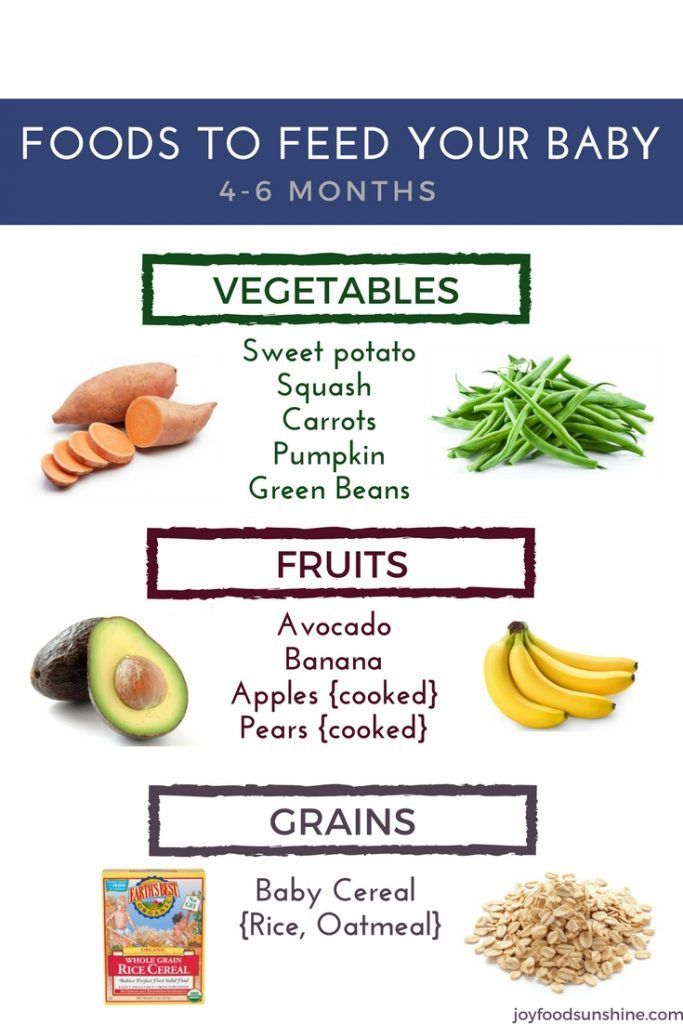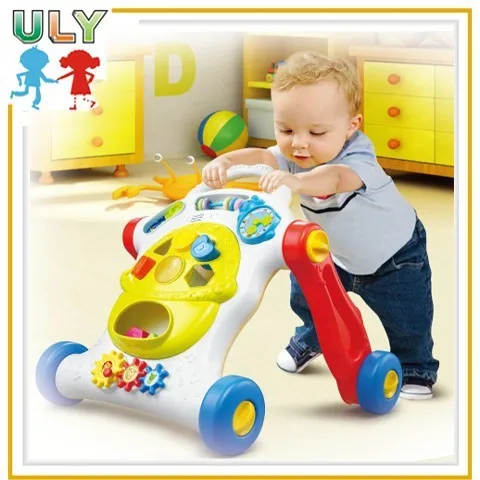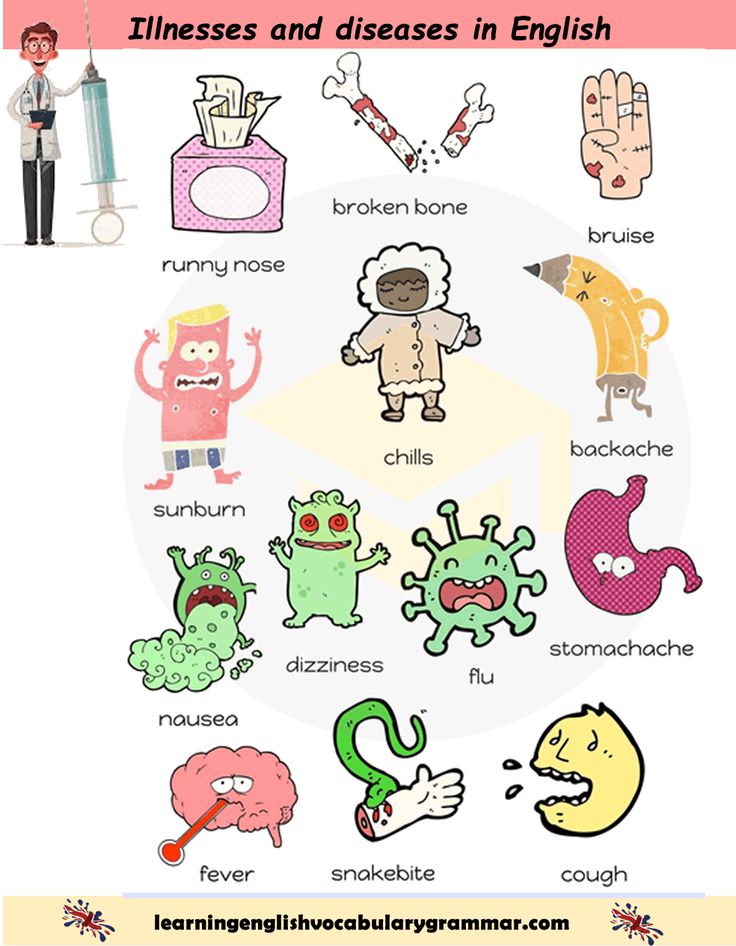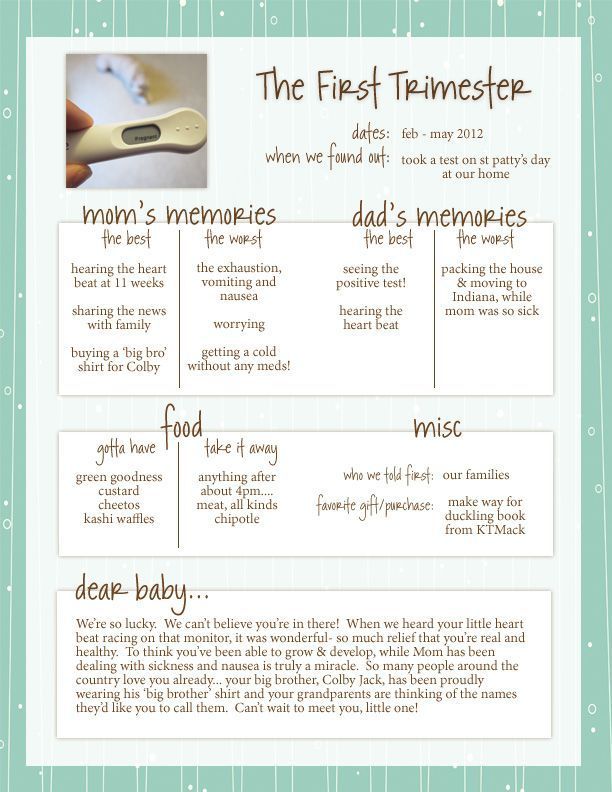Constipation newborn relief
Symptoms, Treatment and When to Call a Doctor
Nationwide Children’s Hospital
Constipation (con-sta-PA-shun) in infants can worry parents. Most of the time, your baby is not really constipated. They may not have developed a routine for pooping yet. Some babies do not develop a bowel movement (BM) pattern for a while.
An infant’s BM pattern can change if their diet changes, like switching from breastmilk to formula, starting solid foods, or drinking less formula than usual. If your baby’s stool (poop) is not soft or easily passed, then they may be constipated.
In rare cases, constipation may be caused by a lack of nerves going to the intestines or by a problem with the way the intestine formed at birth. Your baby can be tested for these conditions if your health care provider feels it is needed.
Signs of Constipation
- less stools than their usual pattern
- straining more than normal to have a bowel movement
- a change in how the stool looks from soft and mushy to:
- small, hard pebbles, or like a large, round golf ball
- loose and watery
- abdomen (belly) bloated or swollen with gas
- painful cramps
Treatment
- If your baby is not eating baby food yet, you may give 1 to 2 ounces of 100% fruit juice (pear, prune, cherry, or apple) once a day.
Stop the juice if their stools become too loose.
- If they are old enough to eat baby foods, feed them pureed pears, peaches, or prunes instead of giving them juice.
- If your baby eats cereal, it may help to give oatmeal, wheat, or barley cereal. Rice cereal can cause constipation in some children.
- Sometimes giving your baby a warm bath to relax them or exercising their legs, like riding a bicycle, will help stimulate the bowels to move (Picture 1).
- If it has been a few days since your baby has pooped and the juice or pureed food has not worked, then you can try a glycerin suppository. Place your baby on their back. Gently push the suppository into their anus (bottom). Suppositories are meant for occasional use.
- Contact your baby’s health care provider before giving them laxatives, baby mineral oil, or enemas to treat constipation.
Medical Therapy
Your child’s health care provider may order the following treatments:
- Give your child medication.
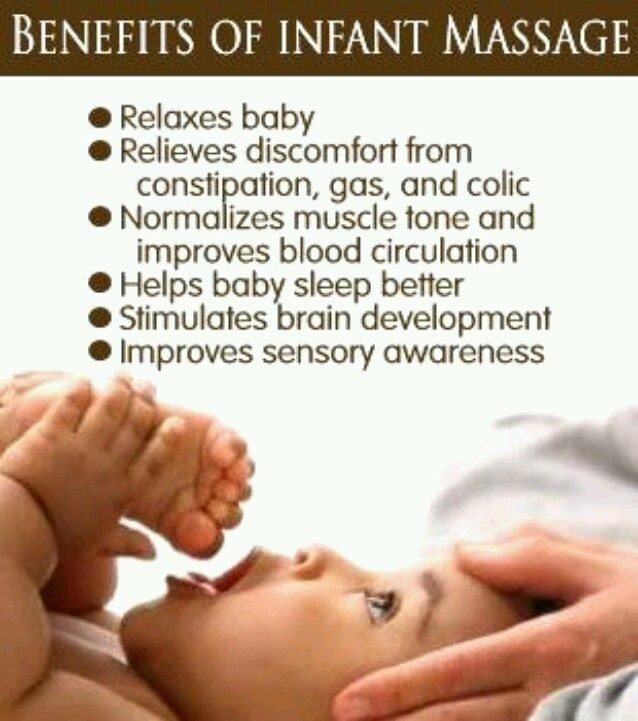
- Check your child’s temperature using a digital, rectal thermometer. Put a small amount of petroleum jelly (Vaseline®) on its tip before inserting into the rectum. Taking a rectal temperature may stimulate the baby to pass stool.
When to Call the Health Care Provider
Call the health care provider if any of the following occurs:
- Your baby is irritable and seems to be having stomach pain. Infants will pull their legs up to their stomach and cry when they are in pain.
- Your baby has constipation and develops vomiting, and their belly looks like it is bloated or filled with gas.
- You see blood in their stool.
- Their constipation does not get better with treatment.
If you have any questions or concerns, call your baby’s health care provider.
Constipation: Infant (PDF), Spanish (PDF), Somali (PDF), Arabic (PDF), Nepali (PDF)
HH-I-14 ©Copyright 1984, Revised 2022, Nationwide Children’s Hospital
You Might Also Be Interested In
Blog
Pelvic Floor Physical Therapy: How It Can Help
Podcast
PediaCast 503 Your Childs Stomach Part 1
Blog
Senna-Based Laxatives for Kids’ Constipation: Are They Safe?
Signs and Ways to Offer Relief
Since baby arrived, you’ve probably talked about poop more than you ever imagined.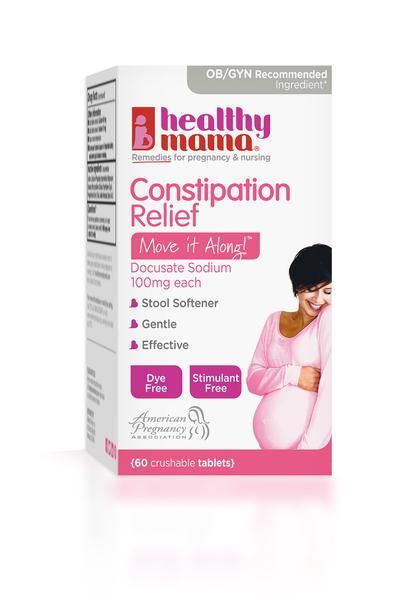 While it might be frustrating to change all those diapers, it’s even more stressful when baby has trouble going or stops altogether. Baby constipation is rough, but sometimes, it’s hard to tell if baby is actually suffering (how little is too little?). Suffice to say, you’ve got poop questions, and we’ve got answers. So is your wee one plugged up, and what does constipated baby poop look like anyway? Here, we’ll give you the lowdown on baby constipation, symptoms to look for, remedies to try and more. You’ll learn what you need to know to get to the bottom of infant constipation and get baby’s belly back on track.
While it might be frustrating to change all those diapers, it’s even more stressful when baby has trouble going or stops altogether. Baby constipation is rough, but sometimes, it’s hard to tell if baby is actually suffering (how little is too little?). Suffice to say, you’ve got poop questions, and we’ve got answers. So is your wee one plugged up, and what does constipated baby poop look like anyway? Here, we’ll give you the lowdown on baby constipation, symptoms to look for, remedies to try and more. You’ll learn what you need to know to get to the bottom of infant constipation and get baby’s belly back on track.
In this article.
Baby constipation: What’s normal and what’s not?
Signs of constipation in babies
What causes constipation in babies
How to help a constipated baby
Baby constipation: When to worry
How to prevent baby constipation
Baby Constipation: What’s Normal and What’s Not?
To figure out if your child has a bout of baby constipation, it’s helpful to know how often infants tend to go.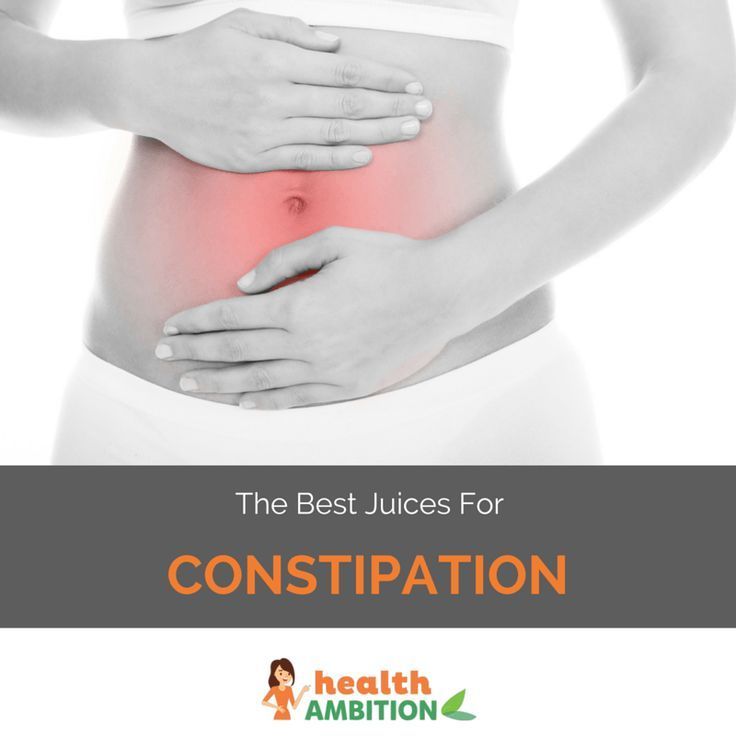 For the first three months, a breastfed baby might have anywhere from 5 to 40 bowel movements a week. Since breastfed babies absorb so much of the milk they take in, some can go up to three or four days—or maybe even a week—without pooping. But as long as when they finally do go it’s soft, pain-free and blood-free, it’s all good, says Lisa Santo Domingo, a pediatric nurse practitioner and medical director of Johns Hopkins Hospital’s Pediatric Chronic Constipation Clinic. Their formula-fed counterparts can have anywhere from 5 to 28 BMs a week (or about two a day).
For the first three months, a breastfed baby might have anywhere from 5 to 40 bowel movements a week. Since breastfed babies absorb so much of the milk they take in, some can go up to three or four days—or maybe even a week—without pooping. But as long as when they finally do go it’s soft, pain-free and blood-free, it’s all good, says Lisa Santo Domingo, a pediatric nurse practitioner and medical director of Johns Hopkins Hospital’s Pediatric Chronic Constipation Clinic. Their formula-fed counterparts can have anywhere from 5 to 28 BMs a week (or about two a day).
As infants age, breastfed and formula-fed babies start to have about the same number of poops—so from 6 to 12 months, they’ll both experience an average of two poops a day. Keep in mind, these numbers can vary greatly.
There’s a pretty wide range of what’s normal when it comes to how often baby poops. Children up to 4 years of age have to fulfill two or more of the following criteria for at least one month to be diagnosed as constipated, says Santo Domingo:
- Two or less bowel movements per week
- A pattern of painful or hard bowel movements
- History of excessive stool retention
- A large fecal mass felt in the rectum during a physical exam by baby’s doctor
Signs of Constipation in Babies
In addition to the symptoms mentioned above, you’ll probably notice a few other signs of baby constipation.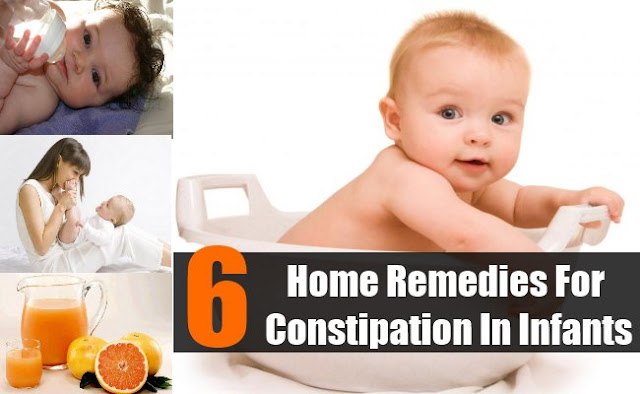 Irritability and a decreased appetite, which might disappear shortly after baby passes a large stool, are often telltale clues.
Irritability and a decreased appetite, which might disappear shortly after baby passes a large stool, are often telltale clues.
Worried about all that moaning and groaning? Take a deep breath; it’s perfectly normal and isn’t a sign of constipation in babies. “Grunting and straining to push out a stool is normal in young babies. It’s difficult for them to pass a bowel movement while lying flat on their backs and not getting any benefit from gravity,” says Trina Blythe, MD, a pediatrician at Progress West Hospital in O’Fallon, Missouri.
Babies’ bodies often need time to figure out the whole pooping process, like learning how to relax their pelvic floor to have a bowel movement. “A lot of parents come in and think their child is constipated, when what they’re really dealing with is infant dyschezia—a condition in which an otherwise normal, healthy infant will have at least 10 minutes (though often more) of straining, crying, irritability and maybe turning red or purple in the face while trying to have a bowel movement,” Santo Domingo explains.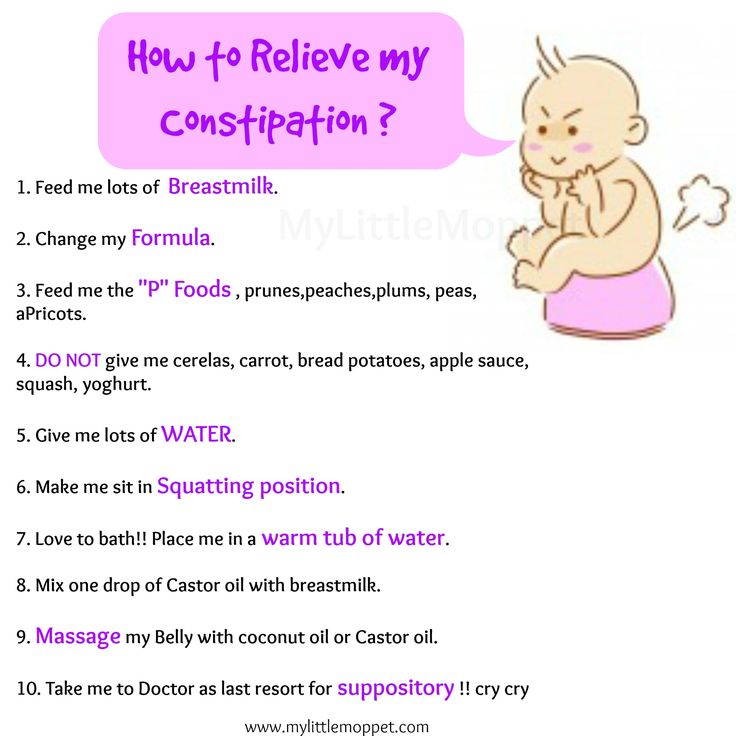 These symptoms continue until baby finally goes—but the resulting stool is actually soft.
These symptoms continue until baby finally goes—but the resulting stool is actually soft.
Baby constipation can cause a child to be irritable and fussy, refuse food and push away the bottle. Toddlers who can walk may start going to a corner and squatting or hiding. “The most prevalent cue is when a child starts tip-toeing,” Santo Domingo says. It’s like an instinct they have, feeling that the straighter their body, the better they’ll be able to withhold pooping, which may be painful or scary for constipated children. Even babies who are able to pull themselves to stand will try to straighten out as much as possible when they’re dealing with constipation.
What does constipated baby poop look like?
When baby constipation is to blame, baby’s poop comes out in hard balls. “We often use the Bristol Stool Scale, which shows the range of stool textures from one to seven: One is rabbit-like, pellet-shaped poop, and seven is pure liquid,” Santo Domingo says. “We define constipated stool as anything that falls into levels one through three, with three looking like a collection of grapes or corn on the cob. ”
”
Another common sign of constipation in babies is a small amount of blood on the outside of the stool—this can happen when a constipated baby passes stool large enough to create a tiny fissure around the anus. If you’re seeing a significant amount of blood, call your child’s doctor right away.
What Causes Constipation in Babies?
So what causes constipation in babies? Really, it could be due to a number of factors, from foods they’re eating to passing illnesses to family history. Here, we break down the most common reasons behind baby constipation:
-
Change in diet. More often than not, a change in diet is the culprit causing baby constipation—whether it’s because you’re shifting from breast milk to formula, transitioning baby to cow’s milk or introducing solid foods. “The introduction of cow’s milk protein—and an allergy or intolerance to it—is probably the largest contributor to baby constipation,” says Santo Domingo. When baby has a cow’s milk protein intolerance (CMPI), their immune system sees the milk protein as something bad it needs to fight off (like it would with harmful bacteria or viruses).
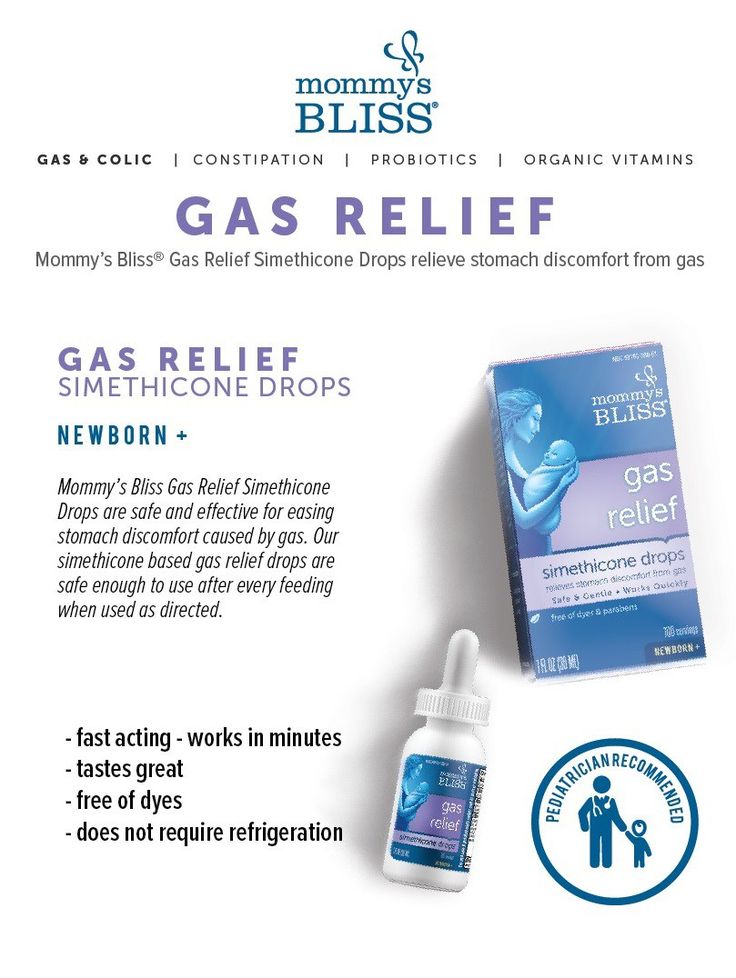 This negative reaction to the protein is what leads to a constipated baby with an upset stomach and other intestinal problems. But the good news is that most babies will grow out of it: 50 percent of infants who have CMPI regain tolerance by 12 months, and more than 75 percent will be back on track by age 3.
This negative reaction to the protein is what leads to a constipated baby with an upset stomach and other intestinal problems. But the good news is that most babies will grow out of it: 50 percent of infants who have CMPI regain tolerance by 12 months, and more than 75 percent will be back on track by age 3. -
Solids. When baby is about 4 to 6 months of age, you can start experimenting with different solid foods. This is when many little ones begin to experience baby constipation for the first time. “For infants who have already started baby foods, giving foods that are high in fiber will help treat and prevent baby constipation,” says Blythe. She recommends feeding them at least two servings of fresh fruits and vegetables daily, and making sure they’re well hydrated.
-
Illness. When baby’s not feeling well, they’re probably not eating or drinking as much as usual, which can throw their system out of whack and result in infant constipation.

-
Certain medications. High-dose iron supplements or and certain pain medications can lead to baby constipation. Your doctor can let you know if baby’s medicine could be to blame.
-
Prematurity. Premature babies tend to have more trouble with infant constipation than full-term babies. Since their digestive systems aren’t fully developed yet, food moves more slowly through the GI tract and isn’t always properly processed, which can lead to dry, hard stools.
-
Family history. Certain issues like Hirschsprung’s disease, cystic fibrosis, chronic constipation and celiac disease (which often can’t be diagnosed in children until they’re closer to age 3) can also be a contributing factor.
How to Help a Constipated Baby
No parent likes to see their child in discomfort and distress, so knowing how to help a constipated baby can make a world of difference. First and foremost, though, it’s important to realize that constipation in newborns can be a different issue than constipation in older babies. If your baby is not even a month old yet, talk to your pediatrician right away—at this age, constipation could be a sign of an underlying issue, such as Hirschsprung’s disease, a rare congenital condition that happens in about one out of 5,000 births and typically requires surgery. (FYI: This is among the reasons everyone at the hospital is so obsessed with the timing of your newborn passing their first meconium.)
If your baby is not even a month old yet, talk to your pediatrician right away—at this age, constipation could be a sign of an underlying issue, such as Hirschsprung’s disease, a rare congenital condition that happens in about one out of 5,000 births and typically requires surgery. (FYI: This is among the reasons everyone at the hospital is so obsessed with the timing of your newborn passing their first meconium.)
Additionally, if you’re exclusively breastfeeding, it’s important to count those dirty diapers each day because infrequent stooling might actually be a sign of not enough feeding volume, says Blythe.
But if you’ve spoken to your pediatrician and ruled out other issues, there are some baby constipation home remedies and treatments you can turn to. Here are some things you should—and shouldn’t— try to help a constipated baby:
Baby constipation home remedies
For baby constipation relief, you can try giving infants under 6 months with hard bowel movements some water—about one ounce. Heard of giving apple or prune juice for baby constipation? Babies 6 to 12 months can have two to four ounces of apple, pear or prune juice a day until their stools soften. “The sugars in juice basically bring water into the bowel to help soften the bowel movement,” Santo Domingo says.
Heard of giving apple or prune juice for baby constipation? Babies 6 to 12 months can have two to four ounces of apple, pear or prune juice a day until their stools soften. “The sugars in juice basically bring water into the bowel to help soften the bowel movement,” Santo Domingo says.
You may have been told that using a rectal thermometer can help offer some infant constipation relief, but Santo Domingo doesn’t recommend any kind of rectal stimulation as a remedy. “You always run the risk of perforation, especially given that that area could be irritated,” she says.
She also discourages giving baby mineral oil or Karo syrup for baby constipation. “We’ve found that it doesn’t help. Karo syrup doesn’t soften the stool—it just coats it to make it easier to pass, but you’re still passing a large stool. And with mineral oil, there have been some reports of aspiration.”
Baby constipation medicine
Wondering what to give a constipated baby? The options are limited.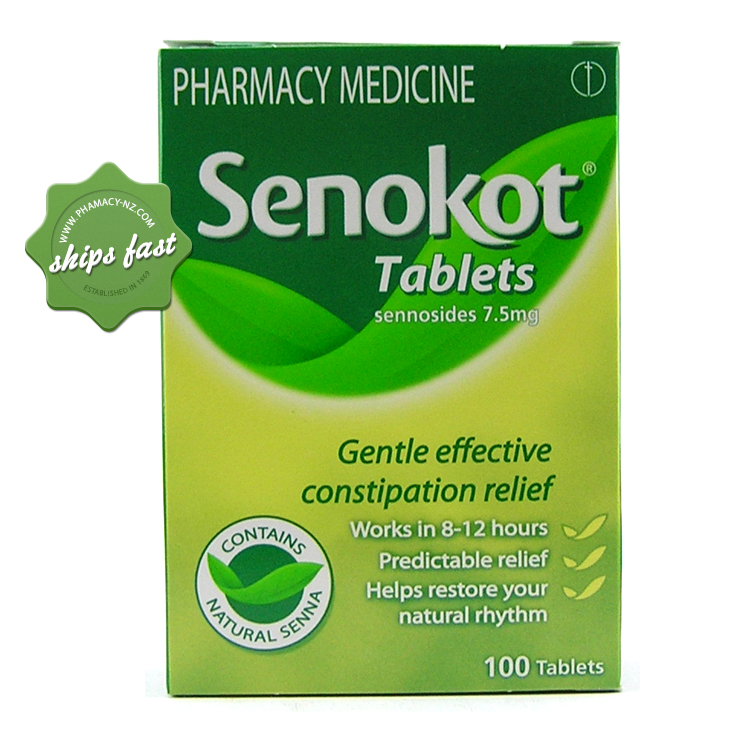 For children who don’t respond to water or juice, you may consider trying a small glycerin suppository to help relieve baby constipation, suggests the Mayo Clinic. It’s important to note, however, that these are meant for occasional use, and shouldn’t be a regular part of baby’s routine.
For children who don’t respond to water or juice, you may consider trying a small glycerin suppository to help relieve baby constipation, suggests the Mayo Clinic. It’s important to note, however, that these are meant for occasional use, and shouldn’t be a regular part of baby’s routine.
Some well-meaning friends may recommend gripe water or gas drops. These remedies are generally considered safe, but there’s little evidence these options work to relieve baby constipation. However, many parents say that the former alleviates colic and other tummy troubles and the latter works miracles breaking up gas bubbles. If your doctor gives you the go ahead, there’s no harm in trying either option.
Similarly, probiotics for baby constipation have been increasing in popularity lately, but Blythe remains skeptical. “Probiotics haven’t yet been proven to relieve constipation in infants, so I generally don’t recommend them.” Still, anecdotally, many parents swear by infant-safe tummy and probiotic drops that can help balance bad and good bacteria in the digestive tract.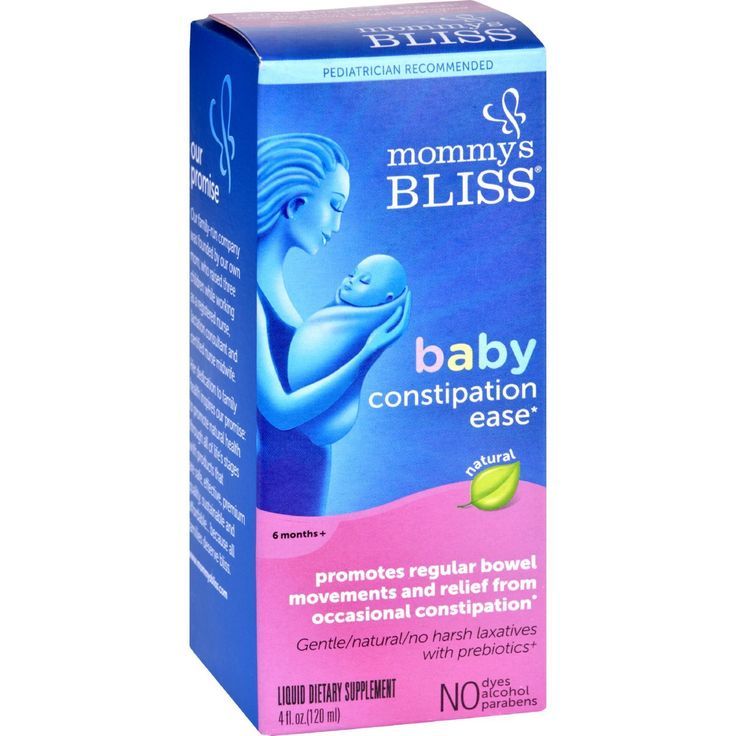 What’s more, while the evidence isn’t concrete, some research indicates that prophylactic use of probiotics can help alleviate some types of digestive troubles in infants. Suffice to say, it doesn’t hurt to try. Of course, before you give baby constipation medication or remedies at home, check in with your pediatrician.
What’s more, while the evidence isn’t concrete, some research indicates that prophylactic use of probiotics can help alleviate some types of digestive troubles in infants. Suffice to say, it doesn’t hurt to try. Of course, before you give baby constipation medication or remedies at home, check in with your pediatrician.
Baby foods that help with constipation
In some cases, your baby’s doctor may want to consider eliminating cow’s milk for a short period of time to see if that’s causing constipation.
For babies eating solids, you can also offer certain baby foods that help with constipation: Try feeding barley or oatmeal cereals, prunes, peaches, plums, apricots and most vegetables. There’s no need to completely eliminate binding foods like bananas and rice, but it’s a good idea to cut back on them if you’re noticing baby constipation symptoms. “Bananas and rice are common binding agents, because they are soluble fibers that soak up water as they pass through your system, and tend to bulk stools,” Santo Domingo says.
Baby massage for constipation
Want to know how to relieve constipation in babies quickly? One of the easiest things you can try is giving baby a massage. Blythe recommends trying a gentle tummy massage of the left side of the belly to help stimulate the colon. And you can do exercises with baby as well. “Bicycling the hips and holding the knees up in a squat position helps simulate the movements needed to have a bowel movement,” Blythe says. You can also try a warm bath. ‘
Baby Constipation: When to Worry
Baby constipation can be pesky, but it’s typically not cause for concern. Still, if constipation lasts for two or more weeks or if it’s accompanied by other symptoms, including fever and abdominal swelling, reach out to your pediatrician, recommends the Mayo Clinic. If you see blood in your child’s stool, you’ll also want to check in to make sure there are no other issues at play.
How to Prevent Baby Constipation
As for preventing infant constipation, unfortunately there’s a lot you can proactively do.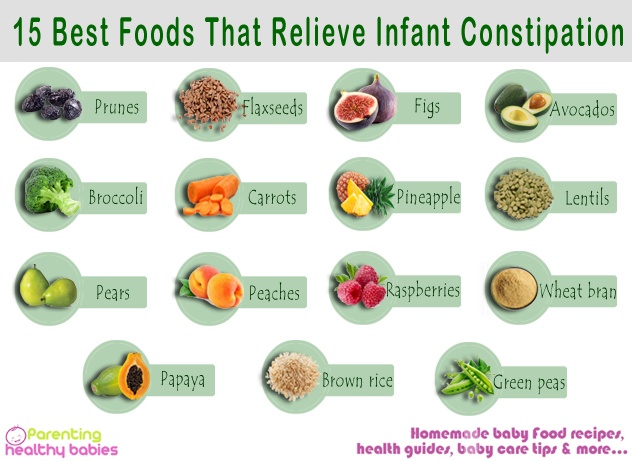 “Prevention really comes down to recognizing the warning signs, and trying to stay on top of them,” Santo Domingo says. Of course, monitoring baby’s diet for foods that cause constipation, giving them a diverse assortment of fibrous fruits and veggies and keeping them hydrated may help.
“Prevention really comes down to recognizing the warning signs, and trying to stay on top of them,” Santo Domingo says. Of course, monitoring baby’s diet for foods that cause constipation, giving them a diverse assortment of fibrous fruits and veggies and keeping them hydrated may help.
About the experts:
Trina Blythe, MD, is a BJC Medical Group pediatrician at Progress West Hospital in O’Fallon, Missouri. She received her medical degree from Albany Medical Center in New York.
Lisa Santo Domingo, DNP, MSN, is a pediatric nurse practitioner and medical director of Johns Hopkins Hospital’s Pediatric Chronic Constipation Clinic. She received her doctor of nursing degree at Johns Hopkins University in Baltimore, Maryland.
Please note: The Bump and the materials and information it contains are not intended to, and do not constitute, medical or other health advice or diagnosis and should not be used as such. You should always consult with a qualified physician or health professional about your specific circumstances.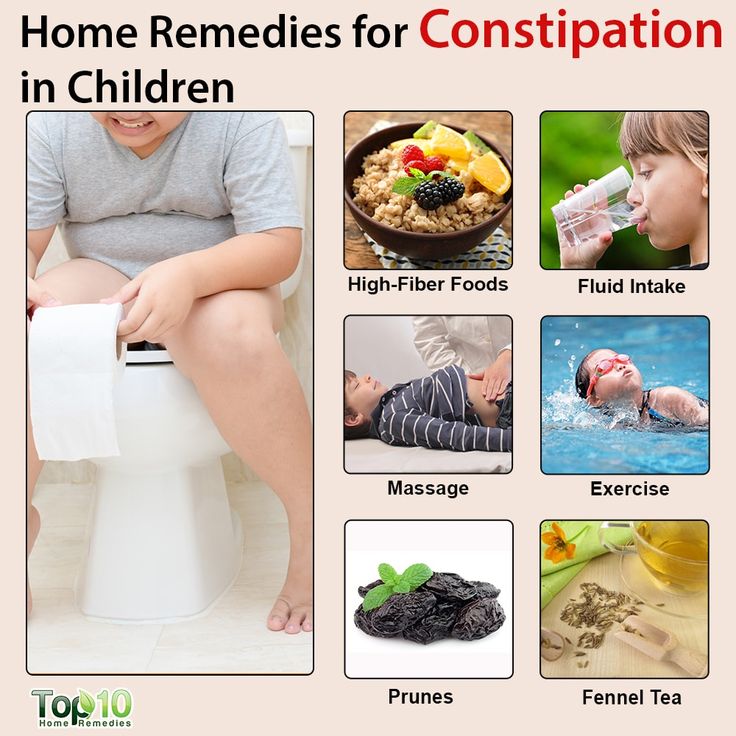
Please note: The Bump and the materials and information it contains are not intended to, and do not constitute, medical or other health advice or diagnosis and should not be used as such. You should always consult with a qualified physician or health professional about your specific circumstances.
Plus, more from The Bump:
What to Do for a Gassy Baby
Colic 101: How to Help Soothe Your Colicky Baby
Why Babies Get Hiccups (and How to Get Rid of Them)
Constipation in a newborn: what to do | Causes of constipation in a newborn baby | Drinking regimen
Author, editor and medical expert - Klimovich Elina Valerievna.
Pediatrician and medical expert - Arutyunyan Mariam Arutyunovna
Views: 573 776
Last update date: 12.12.2022.
Average reading time: 6 minutes
Content: 9000 Content: 9000 maintenance0024
How to understand that crumbs constipation
when constipation is a temporary problem
constipation in newborns in diseases
Functional constipation in babies of the first year of life
What to do if the newborn constipation is
Constipation is a pathology that people of any age face, including newborns and babies in the first months of life.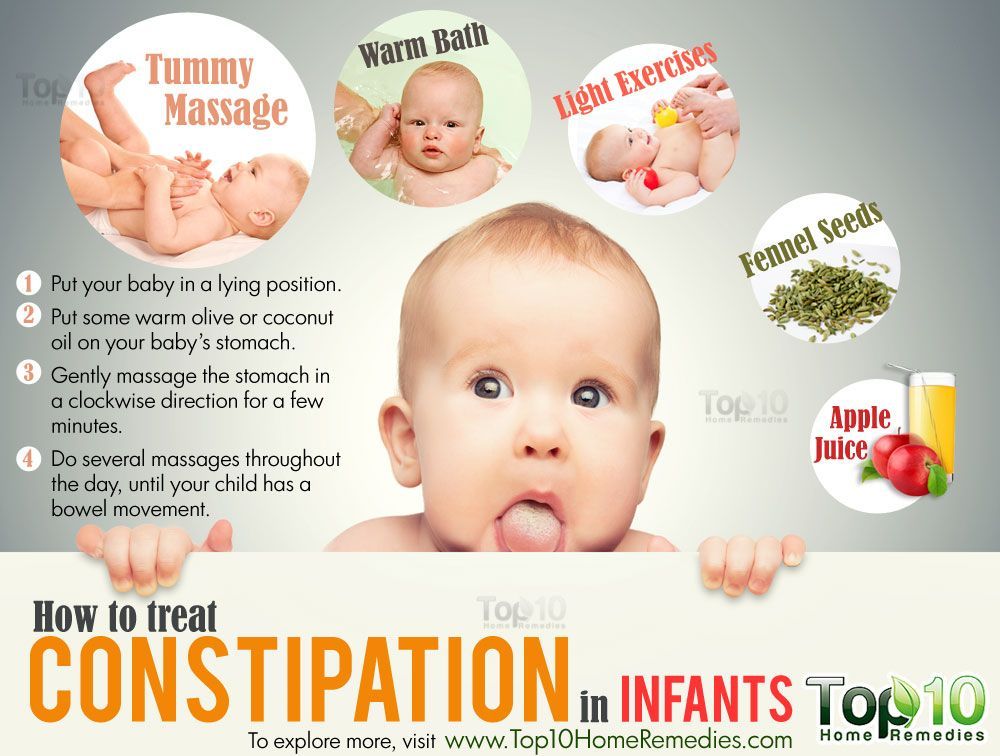 And although it is believed that the “debut” of the problem in children occurs at about the age of 2 years, the first “bells” usually appear already in the first year of life 1 . Why constipation occurs in newborns and infants and what to do when they appear?
And although it is believed that the “debut” of the problem in children occurs at about the age of 2 years, the first “bells” usually appear already in the first year of life 1 . Why constipation occurs in newborns and infants and what to do when they appear?
How to understand that the baby has constipation
Constipation, or constipation, is commonly understood as a violation of the function of the gastrointestinal tract, manifested by rare stools, thickening and fragmentation of feces, difficulty in defecation 1.2 . However, for young children there are no strict criteria for the normal frequency of bowel movements 1 . It depends not only on age, but also on the type of feeding of the baby. The consistency of feces is also evaluated depending on the nature of the diet. nine0003
According to the accepted norms, in children of the first four months of life (before the introduction of complementary foods), who are breastfed , the rectum should be emptied after each feeding, and the feces should have a homogeneous mushy consistency.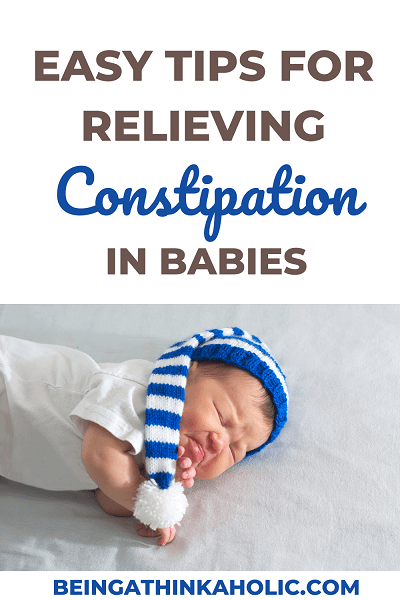 If the stool is less than 4 times a day, and the feces are thickened, this is a reason to talk about constipation in a newborn or infant 1.2 .
If the stool is less than 4 times a day, and the feces are thickened, this is a reason to talk about constipation in a newborn or infant 1.2 .
Approximately 4-6 months with the expansion of the diet, the child's stool becomes rarer - 2 times a day. Feces are compacted and formed into a cylinder 1 .
Formula-fed babies normally empty their intestines at least once a day at a certain time 1.2 . Feces are soft and cylindrical 1.2 . In this case, there should not be any difficulties in defecation.
Keep in mind that stool frequency is not the only guide to diagnosing constipation in infants. Even if the frequency of bowel movements is within the age norms, but the baby’s stool is dense, fragmented and meager, and the emptying of the rectum itself causes him suffering, this is a reason to talk about constipation in a baby or “artificial” 1.2 .
Back to Contents
When Constipation Is a Temporary Problem
The main cause of difficult defecation in infants today is the functional immaturity of the body 2 , leading to inconsistent work of the muscles of the anterior abdominal wall and rectal sphincters.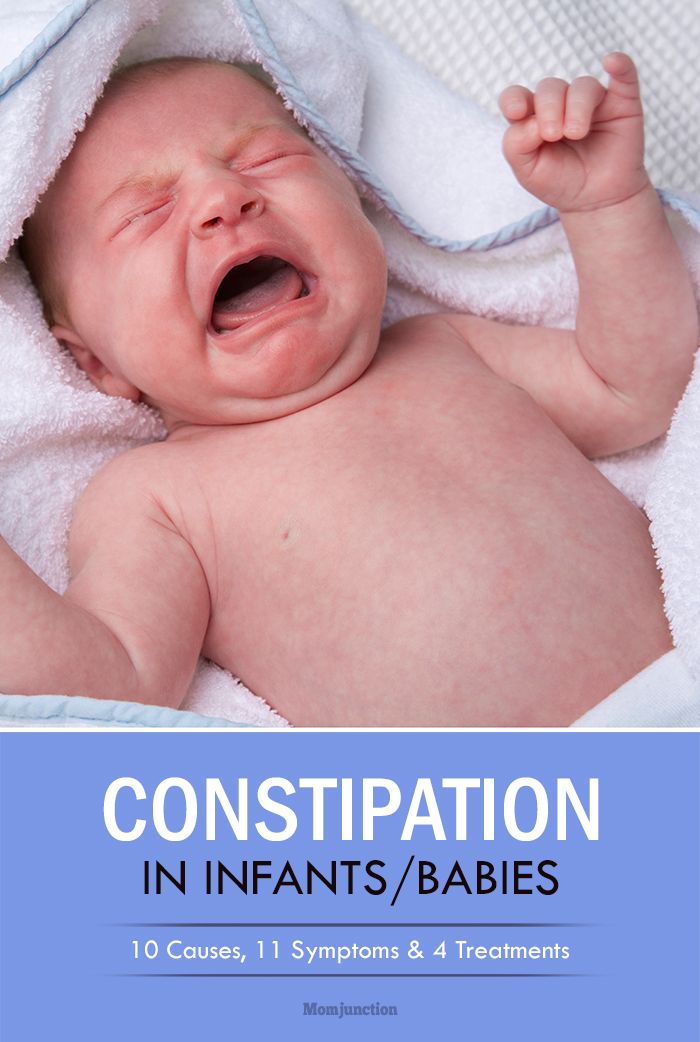 Normally, the urge to defecate causes contraction of the abdominal muscles (pulling) and simultaneous relaxation of the muscles that close the anus. If this process is disturbed, and the sphincters of the rectum relax late, defecation is disturbed. Doctors call this condition infantile dyschezia, not constipation.0003
Normally, the urge to defecate causes contraction of the abdominal muscles (pulling) and simultaneous relaxation of the muscles that close the anus. If this process is disturbed, and the sphincters of the rectum relax late, defecation is disturbed. Doctors call this condition infantile dyschezia, not constipation.0003
Diagnostic criteria for dyschezia:
- baby is less than 9 months old;
- the baby strains hard (more than 10 minutes) before emptying the intestines;
- stools remain soft, as expected when breastfeeding or bottle-feeding.
Up to content
Constipation in newborns due to diseases
The main causes of constipation vary with age. It is believed that a violation of the excretion of feces in the first month of a child's life (the neonatal period) is most often associated with organic pathology, that is, diseases or conditions that affect not only the functions of the intestines. nine0003
Constipation in infants and infants can be a manifestation of various pathologies:
- Neuromuscular diseases that disrupt intestinal motility - congenital megacolon, spinal cord lesions, dysplasia of the nervous tissue of the intestine.
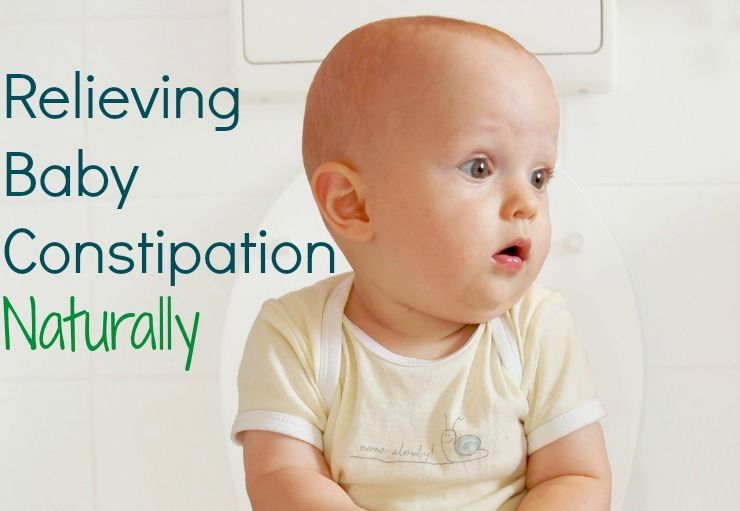
- Anatomical defects, such as narrowing and obstruction of the intestine.
- Systemic diseases - rickets, hypothyroidism and thyrotoxicosis, Down's syndrome, connective tissue diseases, etc.
- Congenital intolerance to cow's milk protein and gluten (cereal protein). nine0092
Up to content
Functional constipation in infants during the first year of life
In the vast majority of cases, constipation in young children is associated with temporary disturbances in intestinal motility as a result of nutritional defects of the nursing mother or the baby itself 1.2 .
| Nutritional causes of constipation in neonates and infants 1 | ||||||
| Underfeeding resulting in decreased volume and hardening of feces | Malnutrition of a nursing mother, in particular the abuse of "fixing" products containing little coarse fibers | Refusal of breastfeeding and transition to artificial feeding | Insufficient fluid intake in the body of the child, especially if he is on artificial food or receiving complementary foods | nine0135 Feeding of non-adapted products, e. | Introduction of low-fiber foods such as semolina as complementary foods | |
The situation is aggravated by the baby’s low physical activity, mother’s excessive insistence and haste in potty training, and, in particular, the frequent irrational use of the gas tube, enemas and irritating laxatives to empty the rectum 1.2 .
Up to contents
What to do if a newborn has constipation
48 hours after baby is born,
All of the above symptoms are a reason for an immediate visit to the doctor and examination of the baby.
With functional constipation, the problem is usually solved by normalizing the nutrition of a nursing mother and baby, laying out after eating on the stomach, tummy massage and special therapeutic exercises.
Disposable microenemas MICROLAX ® approved for use in children from 0 years of age can be used to empty the bowels 3 . Microclysters are equipped with a special short “spout”, which facilitates their use in babies 3 .
Thanks to the active ingredients, MICROLAX ® promotes softening of feces and facilitates their elimination 3 . At the same time, the action can begin after 5-15 minutes, which allows you to quickly alleviate the suffering of the crumbs 3 .
Back to Contents
The information in this article is for reference only and does not replace professional medical advice. For diagnosis and treatment, contact a qualified specialist. nine0028
Prevention of constipation in infants
Constipation in children under 1 year old is a common problem faced by parents. It gives a lot of anxiety to both adults and kids. Children become moody, cry and refuse to eat. It is important that parents do not self-medicate - only a pediatrician can determine the tactics of treating constipation. However, there are general measures to prevent constipation in children under 1 year of age that will help alleviate the condition of the child 1 :
It is important that parents do not self-medicate - only a pediatrician can determine the tactics of treating constipation. However, there are general measures to prevent constipation in children under 1 year of age that will help alleviate the condition of the child 1 :
Enough drinking
Regardless of the nature of constipation, it is important that the baby receives enough fluids. It can be water, age-appropriate juices, compotes, fermented milk products 1 .
belly massage
It helps with insufficient intestinal motility, which is often found in children. Massage of the tummy is carried out clockwise. It is useful to lay the baby on the stomach. Sometimes light stroking around the anus helps 1 .
Diet
For children who are bottle-fed, special mixtures have been developed to prevent constipation. If the baby receives only mother's milk, the mother must follow a diet. Her diet should be dominated by vegetable and sour-milk dishes, and she should significantly reduce her intake of fatty and refined foods 2 .
Daily regime
As a measure to prevent constipation in children under one year old, it is important to observe the regimen of feeding, sleeping, walking, etc. This forms a number of correct habits in the baby, including the habit of cleansing the intestines at about the same time 2 .
To alleviate the condition of the baby, relieve unpleasant symptoms, restore bowel function, especially with prolonged constipation, the use of laxatives is recommended.
For babies, it is important to choose a safe laxative with a mild effect and a minimum number of contraindications. The optimal choice of such a laxative is Duphalac ®.
Duphalac ® has a high safety profile and can be taken from birth 3 . The syrup is convenient to give to children, it can be added to porridge, milk or yogurt. Dufalac ® has a double action: gently cleanses the intestines and normalizes the balance of its microflora 3 .
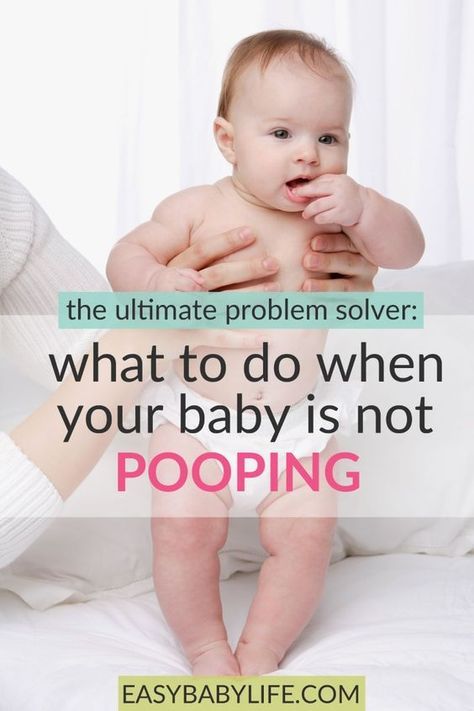 g. cow's or goat's milk
g. cow's or goat's milk 


